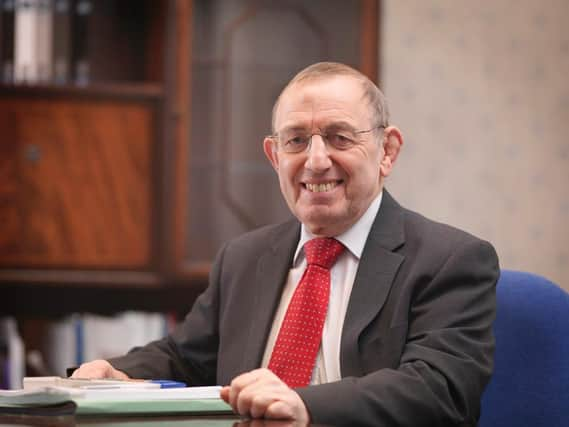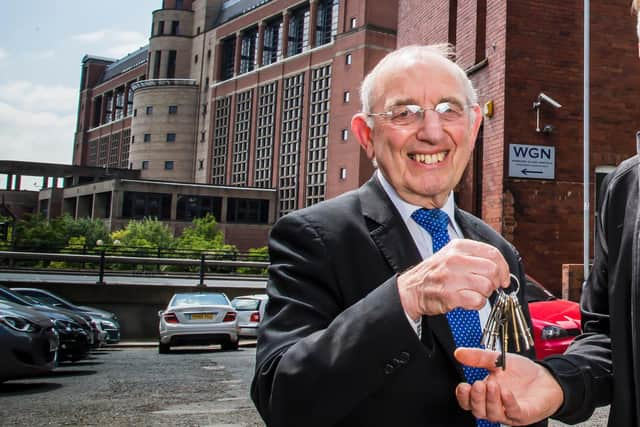'I hope this wakes people up' - Why Leeds's Colin Glass believes the next recession will the worst he has ever seen


THESE are risky times for people in business – just ask anyone who has endured the stock market’s white-knuckle rollercoaster ride this spring.
When the FTSE 250 loses over 40 per cent of its value within four weeks, you know it’s anything but business as usual.
Advertisement
Hide AdAdvertisement
Hide AdBut when it comes to nurturing start-ups and helping small companies weather the coronavirus storm, Colin Glass OBE believes more risks should be taken.


“Lives are at stake, so you’ve got to take commercial risks that you wouldn’t normally take,” he says.
Mr Glass is a founding partner of Leeds-based accountancy firm WGN, which merged with Murray Harcourt last year, and he knows all about risk. He pioneered the strategy of “rolling up” start-ups’ accountancy fees – a euphemism, he says, for “writing them off” – in return for a small stake in the company.
“In those days, there were very few people who were prepared to take the huge risk that we were prepared to – which was to risk our fees – to get involved with these companies,” he says.
Advertisement
Hide AdAdvertisement
Hide Ad“My partners were a bit shocked, because this was fairly new at the time, but they indulged me, and fortunately the first one we had a go at was a success.”
Over the following years, the same approach was used to great effect with Strait plc, Surgical Innovations, Getech and Coe Group.
Mr Glass, who was recently described by one magazine as a “business legend”, has since held non-executive directorships at numerous companies, including the British Business Bank, the state-owned economic development bank set up by the Government to provide advice and credit to SMEs.
He was awarded his OBE in 2017 for services to business start-ups and entrepreneurship.
Advertisement
Hide AdAdvertisement
Hide AdAs an expert in nurturing early-stage companies, he sees flaws in the Government’s current approach to the coronavirus pandemic, which has included the introduction of the Coronavirus
Business Interruption Loan Scheme (CBILS), offering eligible companies financing worth up to £5m.
“The Government has moved very quickly, which is good, but they’re still making it more complicated than it should be,” he says.
“First of all, CBILS is very good in principle, but it’s all done through the banks, with the British Business Bank overseeing it, and the banks are just overwhelmed with applications, so that makes it more difficult.
Advertisement
Hide AdAdvertisement
Hide Ad“Also, the rules are far too tight. This is a completely different world now and you’ve got to change; everybody’s got to take more risk. They are loans, and ultimately those businesses have to pay them back sometime, but on the other hand, the banks can’t spend weeks worrying whether a business is suitable or not – you’ve got to take a few chances.
“They’ll get it wrong sometimes, but it’s better to get the money out there to keep these businesses alive, because otherwise they won’t be able to last.
“I would cut through the rules, accepting there’s going to be risk there. You can’t escape that. Most businesses want to survive. It’s not as if they’re going to try and get the money and then just let it waste away – they’re going to try and survive.
“I also think there needs to be a much simpler scheme for much smaller businesses – perhaps starting at £50,000 – and they need to bring that in quickly to keep these start-ups alive.
Advertisement
Hide AdAdvertisement
Hide Ad“Because ultimately, small businesses are the life-blood of the economy and they need to be encouraged and helped.”
Getting it right will be crucial in the post-virus economy, which some commentators expect to be as much as 10 per cent smaller even after the situation stabilises. Whatever course of action the Government takes, the consensus is that we are heading for recession.
Mr Glass has coped with several downturns in his career and says the last one, precipitated by the banking crisis in 2008, was the worst because “I don’t think we realised how close to total collapse we were and the government had to intervene at the eleventh hour and 59 minutes”.
Nevertheless, he believes the recession to come will be “by far the worst”.
Advertisement
Hide AdAdvertisement
Hide Ad“That word ‘unprecedented’ has been used a thousand times, but in my lifetime – and in most people’s lifetimes – we’ve never seen anything like it,” he says.
“We now have lives being lost and that overcomes everything – as well as all the financial implications on top of it. We just have to carry on, in every way doing our best – being sensible in the way we carry on our lives, but from a business point of view, thinking outside the box.
“We see this every day, people pivoting their businesses to do something a bit different. Restaurants have started doing takeaways, for example, and other people have changed to manufacturing PPE, even if they’re not going to make much money on it.
“At least it keeps the staff in business and the wheels turning – and buys some time.”
Advertisement
Hide AdAdvertisement
Hide AdLike every good businessman, he sees an opportunity in the crisis, even for those companies that have had to temporarily cease trading.
“It gives them time to prepare their business plans,” he says. “Normally, they’re too busy and it doesn’t take priority, but now they have got time and they really need to think through all the ways that they can take their business forward and also plan their financial forecasting, to see how much spending they’re going to need.
“And then, when it’s all over, they’re going to have to almost go back to square one, as if it’s a start-up, and find the finance and guidance they need. But sales in all industries are going to pick up.”
As for the wider effects of the pandemic over the long term, Mr Glass remains unerringly upbeat.
Advertisement
Hide AdAdvertisement
Hide Ad“I’m an optimist, and I think things are going to change in different directions,” he says.
“I think this will change people’s attitudes towards their fellow neighbours and workers. Hopefully, people will be more helpful, more understanding of situations, because they’ve seen that at the end of the day, where lives are at stake, other things take second place.
“I hope this will wake people up.”
Comment Guidelines
National World encourages reader discussion on our stories. User feedback, insights and back-and-forth exchanges add a rich layer of context to reporting. Please review our Community Guidelines before commenting.